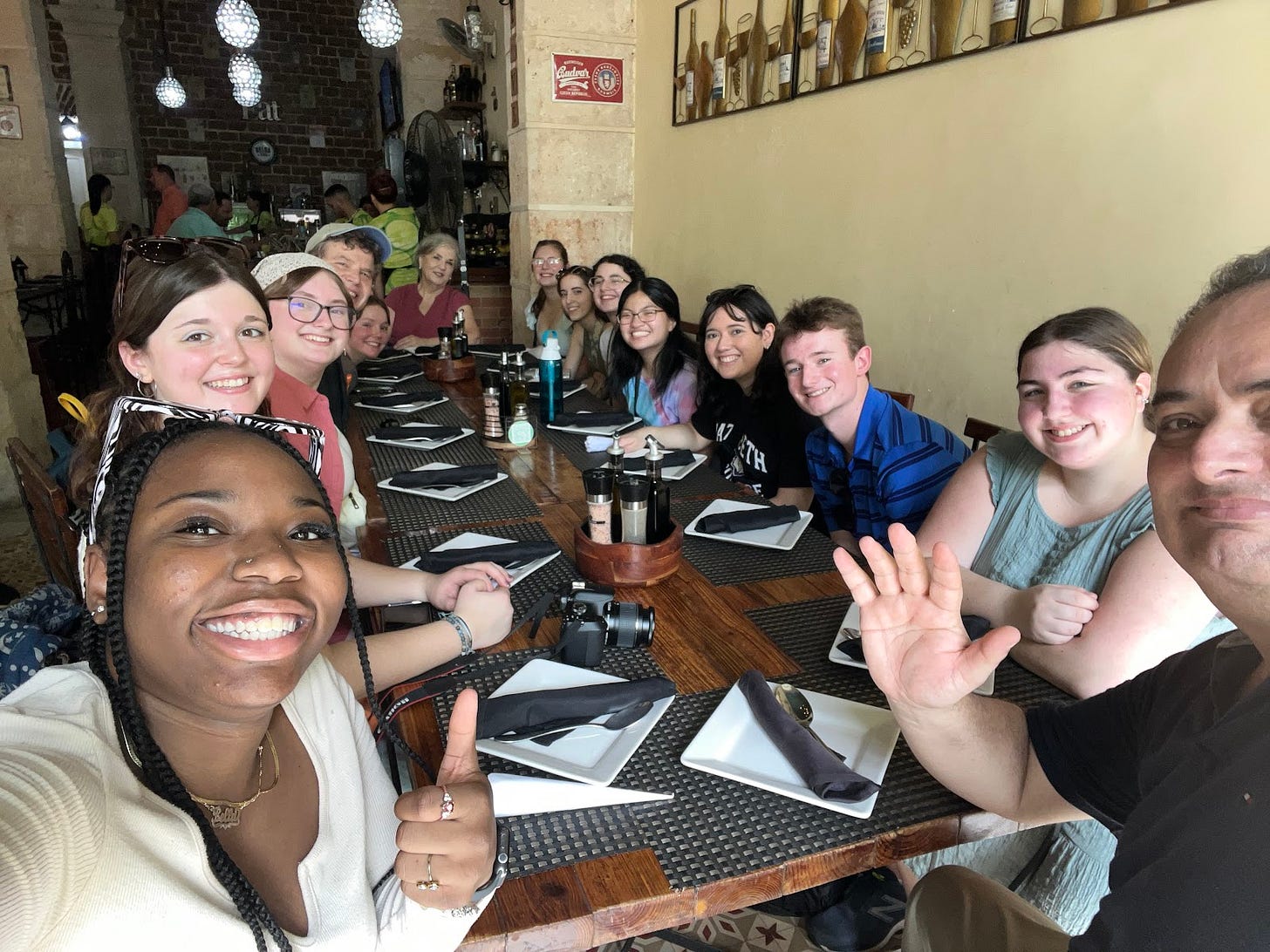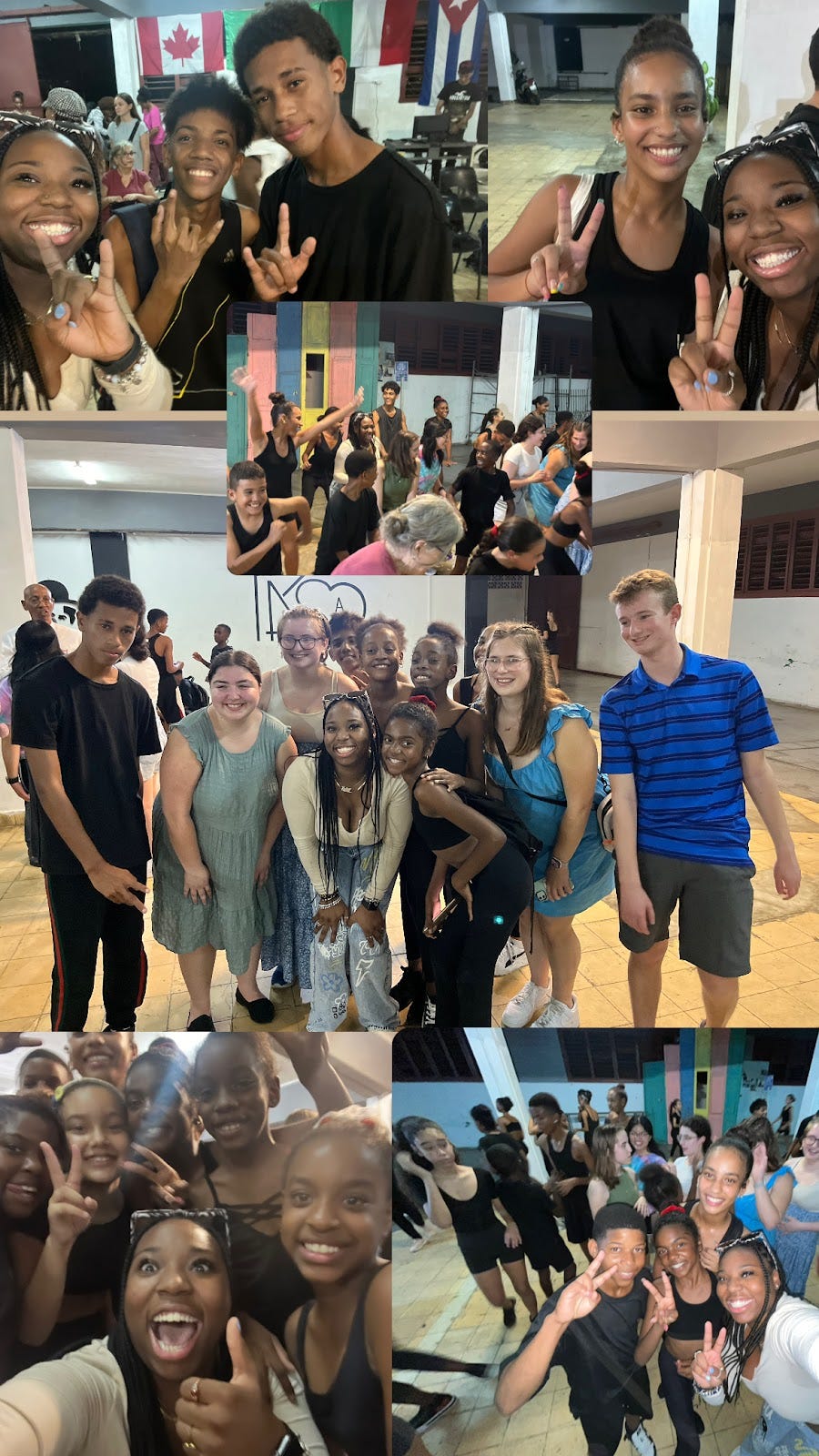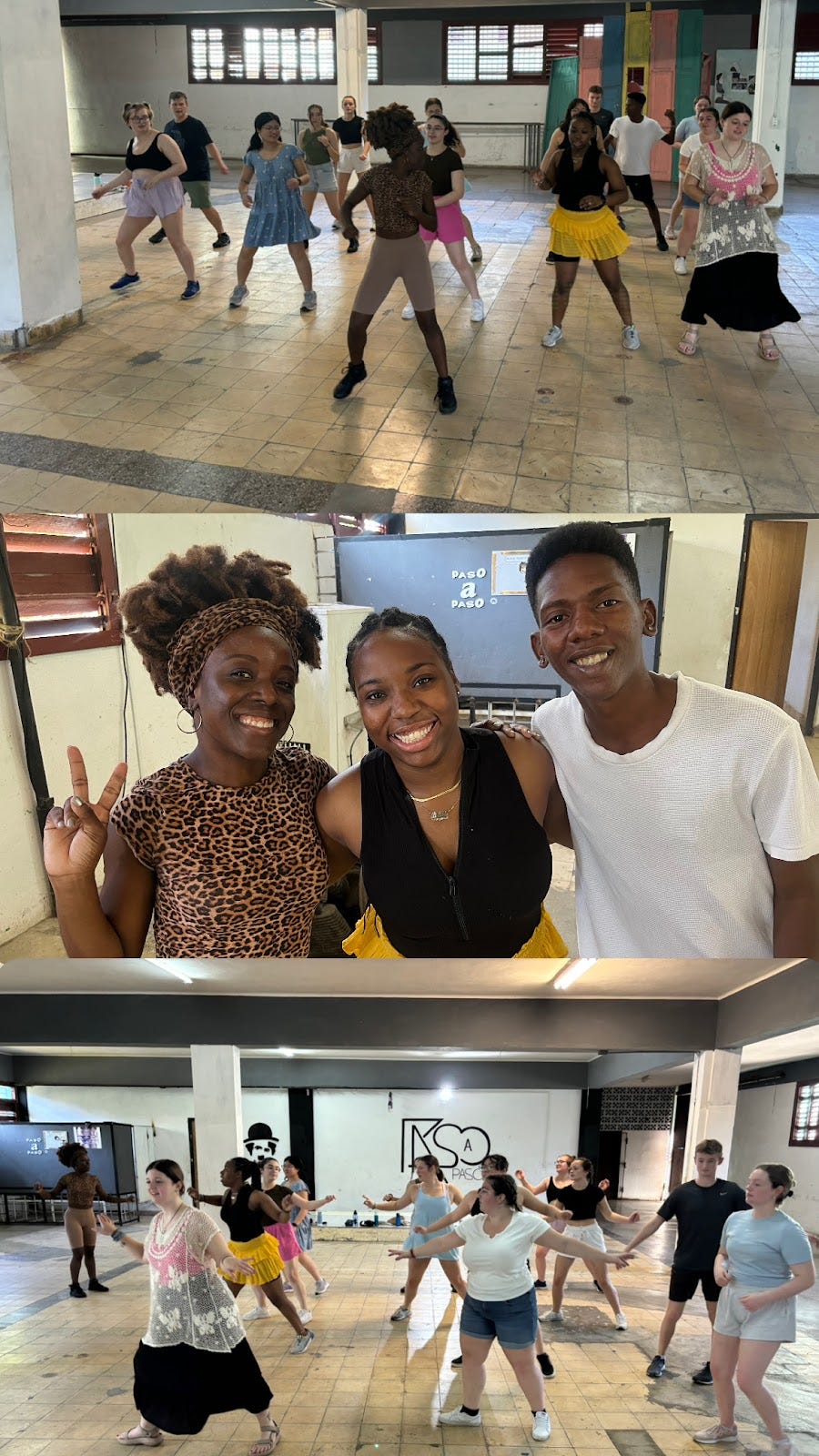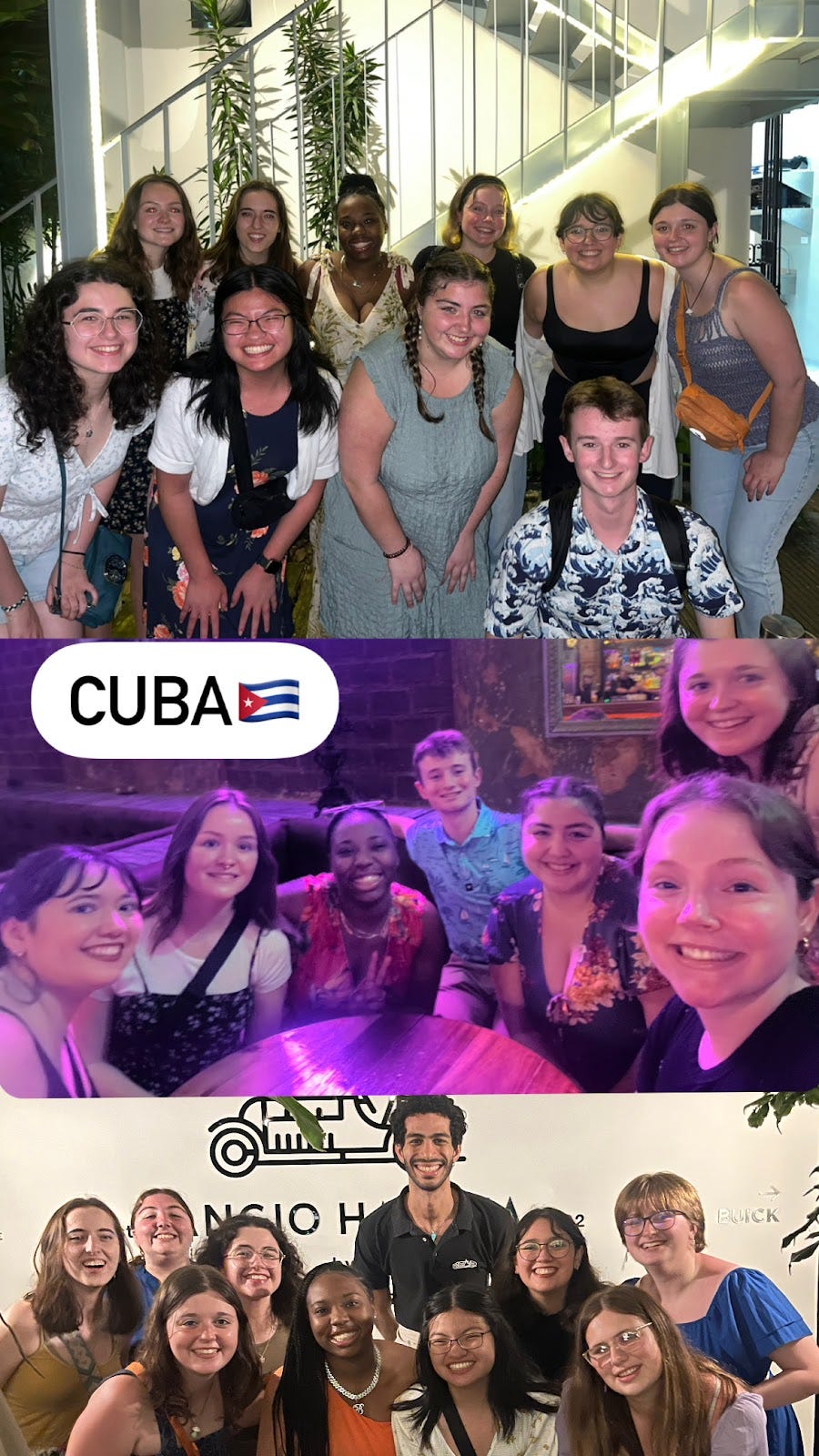Don’t understand it, just appreciate it
Unforgettable Lessons I Gained In Cuba
by Bella Brown
My preconceived notions of Cuba were a tangled mess of poverty, restrictions, and communist shadows. While seeking a unique study abroad experience with the study abroad department at Naz, I stumbled upon a program in Havana, a place I thought, "This might be cool." Little did I know, it would be life-changing.
Anxiety gnawed at me as I boarded the plane. Americans in forbidden Cuba? It felt surreal. But landing in Havana, my nerves dissolved. The airport buzzed with a different energy and vibe, and I was officially "off-grid" - no phone service, just raw immersion.
Meeting the CEO of Aboradia, Tom, felt like stepping into a Wes Anderson film. He introduced us to his team: Abel, our tour guide, and Emmanuel, our bus driver; as we drove to our homestays, I remember looking out the window, stargazed as we drove by the water and on the highway. We finally arrived at our home for the next week and a half. My room was simple, but the air conditioning (the greatest invention in the 20th century as Abel would say) was a godsend in the Cuban "winter" that felt like Rochester's summer.
Dinner was our first taste of Cuban cuisine: chicken, rice, beans, yuca, and freshly squeezed papaya juice. It wasn't gourmet, but it was a reminder I was no longer in MIA airport. That night, sleep came easy, the exhaustion of travel replaced by anticipation of what was to come.
The next day, Havana unfolded its history. We learned from an Afro-Cuban author, his words painting a vivid picture of the Black experience in Cuba versus America. Lunch at Mojito, Mojito was a revelation: a multi-course feast with soup, salad, entree, dessert, and 5 drinks, all for the price of an American appetizer. I learned that day that Cubans eat big lunches.
But the true highlight was the surprise Tom had planned for us all later that night: a dance studio class filled with KIDS! My heart melted. We learned that they practice twice a week after school and look forward to going to dance every day. I learned that tuition for dance is about 500 pesos a month which is $1 U.S dollar. Their faces lit up at our arrival. They taught us their infectious moves, the language of music transcending our limited Spanish. We danced, we laughed, we shared stories, and for a moment, the world shrunk to that studio, filled with the joy of connection.
Later on, towards the end of our trip, we had the opportunity to return back to the dance school and learn the dances we had seen the children perform. We were taught bachata, salsa, hip-hop, and contemporary styles. Immersing ourselves in their world was truly captivating. The dance professor explained that dancing serves as an outlet for the children, and they eagerly anticipate it every day after school. Though the dances were challenging and the instructors didn't speak English, we found no language barrier insurmountable. Dance, we realized, is a universal language, and armed with that understanding, we mastered the choreography.
During my time in Cuba, I was fortunate to partake in various experiences, including zip-lining, exploring the countryside, visiting youth community spaces, enjoying the beach, and meeting a diverse array of individuals: a US deployment, an American journalist, an Afro-Cuban author, a Cuban historian, and many others things. Something that stuck with me throughout my journey was the advice of our tour guide, Abel, who often reminded us, "Do not try to understand Cuba; just appreciate it."
As I delved deeper into Cuban life, I cultivated a profound sense of gratitude and admiration for the country. While Cuba may not be the wealthiest, every Cuban I encountered exuded pride in their heritage, which made me reflect on the privilege of being American. I believe oftentimes, America is very quick to judge others and take people and things for granted, and I believe this journey fundamentally shifted my perspective on life as a whole. Upon departing Cuba, I found myself appreciating the simple joys that I have everyday access to as an American citizen such as—access to the internet, a diverse culinary landscape, opportunities for travel, education, and so much more. As I departed Cuba, a myriad of questions swirled in my mind: How can we contribute to positive change and offer support to countries in need? How do we mend and strengthen our connection with Cuba? And perhaps most pressing, how can we reshape Americans' perceptions of a nation they are forbidden to visit?
This journey wasn't just a mere excursion; it marked a profound transformation within me. The walls of my preconceptions crumbled, replaced by the genuine warmth of Cuban hospitality, the depth of their cultural heritage, and the unifying power of music. Leaving Havana, I carried within me a piece of its soul, forever touched by the smiles and kindness of its people. As I returned to the US, I felt a renewed sense of purpose, advocating for a country not my own because I believe that if circumstances were different, Cubans would advocate for us in return.
However, my return journey was met with a jarring encounter at customs, where unfounded misconceptions about Cuba were regurgitated. As I listened to the officer's misconceptions, I couldn't help but reflect on the stark disparity between perception and reality. Cuba, contrary to these notions, is a country brimming with warmth, safety, and rich cultural heritage. Yet, such misconceptions persist due to restrictions on travel to Cuba, perpetuating a cycle of ignorance and misunderstanding.
I am driven by a fervent desire to enact change. I am determined to challenge these misconceptions and advocate for greater understanding and engagement with Cuba. My experience in Cuba has ignited within me a passion for bridging divides and fostering connections across borders. It's time to dismantle barriers, both physical and ideological, and embrace the richness and diversity of our global community.







Excellent article, Bella! I am so pleased that you interacted with Cuba and experienced it with your eyes and heart. Unlike so many Americans whose impressions of Cuba are driven by the propaganda coming out of Miami, you have had a first-hand experience with real Cuban people; not the political tokens that US politicians have made them become. Keep spreading the word about Cuba!